What to Do if You Get Injured
Medical Institutions
If you are in a traffic accident, you will need medical attention. Each medical institution (hospital, ward, or clinic) has a specific role. Once your treatment at a particular facility is complete, you will typically be discharged or transferred to another facility. Patients with particularly serious injuries may be transferred from one hospital to another over time, from the acute to the convalescent to the long-term care phase.
Even in cases with no hemorrhaging, higher brain dysfunction (*1) or cerebrospinal fluid hypovolemia (leakage) (*2) may occur due to head trauma, etc. If you think this applies to you, consult a specialized medical institution as soon as possible.
Acute Care General Hospital
This is a hospital that provides treatment in the event of a traffic accident. It also treats patients who are seriously injured and whose lives are in danger.
Convalescent Rehabilitation Hospital
After the patient is out of immediate danger, this hospital provides intensive rehabilitation. The goal is for the patient to recover physically and mentally. Then they can return to their home and community.
Long-Term Medical Care Hospital
This hospital provides long-term nursing care and treatment while aiming to prevent the patient's medical issues recurring. It aims to maintain and improve the patient's physical functions while the patient's condition is relatively stable but they remain difficult to cure.
Psychiatric Hospital
This hospital is attended by people with mental illness. In addition to physical disability, traffic accidents may leave the victim with higher brain dysfunction (*1) due to head trauma, and mental illness.
(Reference)
*1: Higher brain dysfunction is a disorder involving residual disabilities such as memory impairment, attention impairment, executive function impairment, and social behavior impairment. These issues occur as the after-effects of traumatic brain injury. Specifically, symptoms may vary. People may become more forgetful, restless, or dazed than before. However, the disorder is difficult to spot, and symptoms may appear some time after the accident, when the patient has returned to daily life.
*2: Cerebrospinal fluid hypovolemia (leakage) is a leakage of cerebrospinal fluid. It causes various symptoms such as headache, dizziness, nausea, and fatigue. Research into the condition is ongoing. Blood patch therapy, which was covered by insurance in April 2016, drinking adequate water, and rest are said to be effective treatments.
Medical Social Worker (MSW)
Hospitals may have professional medical social workers assigned to "medical consultation offices" or "community liaison offices" (the names vary by hospital). Medical social workers assist hospital patients and their families to handle psychological, social, and financial problems. They also help with discharging (transferring) patients from hospital and reintegrating them into the community. Consulting with a medical social worker can help the patient resolve their problems.
Treatment and Rehabilitation Facilities (facilities specializing in persons with severe disabilities due to automobile accidents)
National Agency for Automotive Safety and Victims' Aid (NASVA)
NASVA has established and operates 12 specialized treatment and rehabilitation facilities (NASVA Medical Centers and NASVA Medical Units (*3)) across Japan. They serve persons with severe disabilities due to automobile accidents (those with persistence of impaired consciousness(*4) who have sustained a brain injury as a result of an automobile accident and require treatment and constant nursing care.) They provide appropriate treatment and nursing care while working toward their rehabilitation into the community.
The hospitalization period at these medical facilities is set at three years or less, with approval for hospitalization based on an integrated determination of the necessity for treatment and nursing care, and the possibilities for recovery, etc.
*3: NASVA Medical Units are functional units in medical facilities offering treatment and nursing care equivalent to the NASVA Treatment and Nursing Care Center. This care is outsourced to a general hospital.
*4: Persistent disturbance of consciousness is a severe disturbance of consciousness, such as inability to move or eat on one's own, communicate, or speak meaningfully.
Features of the Treatment and Rehabilitation Facility
Based on information from examinations using highly advanced medical equipment (CT, MRI, PET, etc.), treatment, rehabilitation, etc. is tailored to individual patients.
In addition, a one-floor hospital ward system (or monitoring systems in some NASVA Medical Units) has been implemented to ensure intensive nursing. This in order to enable quick discernment of even the slightest recoveries in the consciousness of hospitalized patients. Also, a primary nursing system has been put in place. This means that the same nurse is continuously in charge of one patient as the primary caregiver. In addition, these facilities expose the patient to natural stimulus in their daily life, and offer treatment and nursing with careful attention.
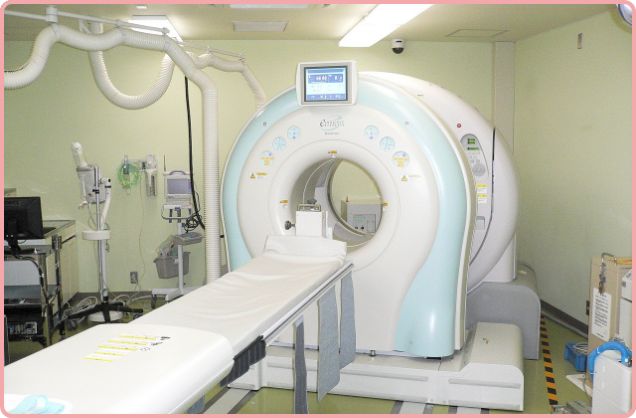
Treatment with highly advanced medical equipment
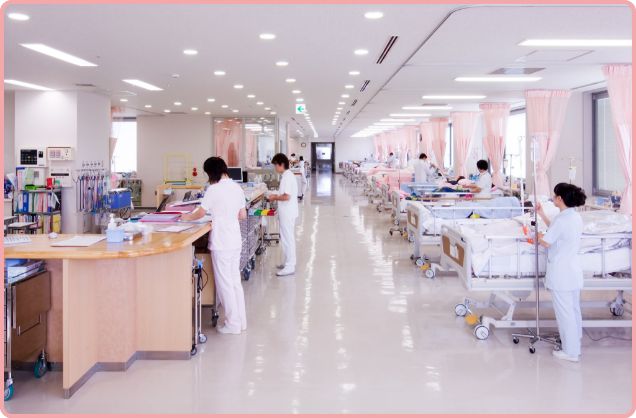
One-floor hospital ward system
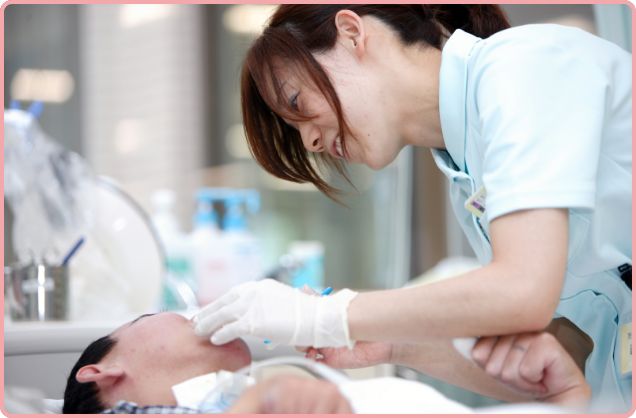
Nursing care by primary nurses
For more information on requirements for hospitalization and how to apply, please visit the NASVA website
(https://www.nasva.go.jp/sasaeru/ryougo.html )
or search for "NASVA Treatment and Nursing Care Center."
Please contact NASVA regarding the program.
NASVA
Location: 19F Arca East, 3-2-1 Kinshi, Sumida-ku, Tokyo 130-0013, Japan
For inquiries, please contact NASVA Medical Centers Group, Injured Party Welfare Department, NASVA 03-5608-7638).
For hospitalization, please contact a treatment and rehabilitation facility.
NASVA Medical Centers
| Name | Location and contact | Number of beds |
|---|---|---|
| NASVA Chiba Medical Center |
3-30-1 Isobe, Mihama-ku, Chiba, Chiba (043) 277-0061 |
80 beds |
| NASVA Tohoku Medical Center |
4-20-6 Nagamachi Minami, Taihaku-ku, Sendai, Miyagi (022) 247-1171 |
50 beds |
| NASVA Okayama Medical Center |
2-8-35 Nishifurumatsu, Kita-ku, Okayama, Okayama (086) 244-7041 |
50 beds |
| NASVA Chubu Medical Center |
630 Kobicho-shimokobi, Minokamo, Gifu, Japan (0574) 24-2233 |
50 beds |
NASVA Medical Units
| Name | Location and contact | Number of beds |
|---|---|---|
| Social Medical Corporation Ijinkai Nakamura Memorial Hospital |
291, Minami 1-jo Nishi 14-chome, Chuo-ku, Sapporo, Hokkaido (011) 231-8555 (ext. 460) |
12 beds |
| Social Medical Corporation Yuki no Seibokai St. Mary's Hospital |
422 Tsubuku Honmachi, Kurume City, Fukuoka (0942) 35-3322 |
20 beds |
| Izumiotsu Municipal Hospital |
16-1 Gejo-cho, Izumiotsu-shi, Osaka (0725) 32-5622 |
16 beds |
| Medical Corporation Kenshinkai Shonan-East General Hospital |
500 Nishikubo, Chigasaki City, Kanagawa (0467) 83-9111 |
12 beds |
| Fujita Academy Fujita Health University Hospital |
1-98 Dengakugakubo, Kutsukake-cho, Toyoake-shi, Aichi (0562) 93-2111 |
10 beds |
| Medical Corporation Asanokawa Kanazawa Neurosurgical Hospital |
262-2 Go-machi, Nonoichi, Ishikawa (076) 246-5600 |
5 beds |
| General Incorporated Foundation Eiraikai Matsuyama Shimin Hospital |
2-6-5 Otemachi, Matsuyama City, Ehime Prefecture (089) 913-0081 |
5 beds |
| Sanseikai Medical Corporation Ibaraki Rehabilitation Hospital |
360 Nakayama, Dochi, Moriya, Ibaraki (0297) 48-6111 |
5 beds |
Cooperating Hospitals and Facilities for
Short-Term Hospitalization
MLIT works with a group of hospitals that offer short-term hospitalization for people with severe residual disabilities, and who qualify for NASVA nursing care fees. These are called "cooperating hospitals for short-term hospitalization." The aim is to maintain the health of people with severe residual disabilities who receive home nursing care from their families, and to reduce the burden on their families. (As a rule, one stay is between 2 and 14 days (30 days for rehabilitation purposes)). Among these hospitals and facilities, hospitals that provide rehabilitation services with particular commitment have been designated as "Key Support Hospitals" since FY2022. Facilities that can provide medical care during the nighttime have been designated as "Key Support Facilities" since FY2023.
List of Cooperating Hospitals and Facilities for Short-Term Hospitalization
https://www.mlit.go.jp/jidosha/jidosha_mn2_000011.html
For more information on eligibility for nursing care fees, please see below.
Treatment Costs (Insurance System)
Victims will need money immediately to pay for medical treatment and other expenses. In addition to payment from the at-fault party, various insurance programs are available for the victim to pay for immediate expenses, but it is up to the victim/family to choose which insurance program to use.
CALI and automobile insurance (including mutual insurance)
CALI (mutual insurance) offers a provisional payout system so that you can receive money to cover your immediate expenses as soon as possible. In the case of death, 2.9 million yen can be claimed from the at-fault party's non-life insurance company (mutual insurance association). In case of injury, 400,000 yen, 200,000 yen, or 50,000 yen can be claimed, depending on the degree of injury.
With regard to voluntary automobile insurance and mutual insurance, please confirm the relevant insurance policies.
Industrial accident compensation insurance
If you are involved in a traffic accident while at work or commuting to work, you may file a claim with industrial accident compensation insurance.
In the case of a traffic accident where there is an at-fault party and compensation is possible, industrial accident compensation insurance will take over for the at-fault party, so procedures such as submitting a "notification of harm due to a third-party act" are required.
For details, please contact the Workers' Compensation Hotline or the Labor Standards Inspection Office in the area where you work.
Workers' Compensation Hotline
0570-006031 (9:00 - 17:00 except Saturdays, Sundays, national holidays and year-end and New Year holidays)
Labor Standards Inspection Office
For the location and contact information of the Labor Standards Inspection Office in the area where you work, please visit the Ministry of Health, Labour and Welfare's website
(https://www.mhlw.go.jp/kouseiroudoushou/shozaiannai/roudoukyoku/)
or search for "List of Labor Standards Inspection Offices Locations."
Health Insurance/National Health Insurance
You can use your health insurance just as you would if you were visiting a hospital for an illness or injury other than a traffic accident. However, if you are involved in a traffic accident on the job or while commuting to work, you will not be able to use your health insurance. In addition, as with industrial accident compensation insurance, if there is a at-fault party and damages can be compensated, as in the case of traffic accidents, health insurance will shoulder the responsibility on behalf of the at-fault party. So, procedures such as submitting a "notification of injury or sickness due to a third-party act" are required.
For more information, please consult your hospital (medical social worker, etc.).
If you Remain Disabled
When no further benefit is expected from treatment for injuries sustained in a traffic accident and there is no prospect of recovery in the future, procedures for residual disability can be taken based on the doctor's judgment that the symptoms have been fixed (disability remains).
In order to be recognized as having a residual disability caused by an automobile accident, a reasonable causal relationship between the injury and the residual disability must be recognized.
Please use this information to ease your
concerns and for support.
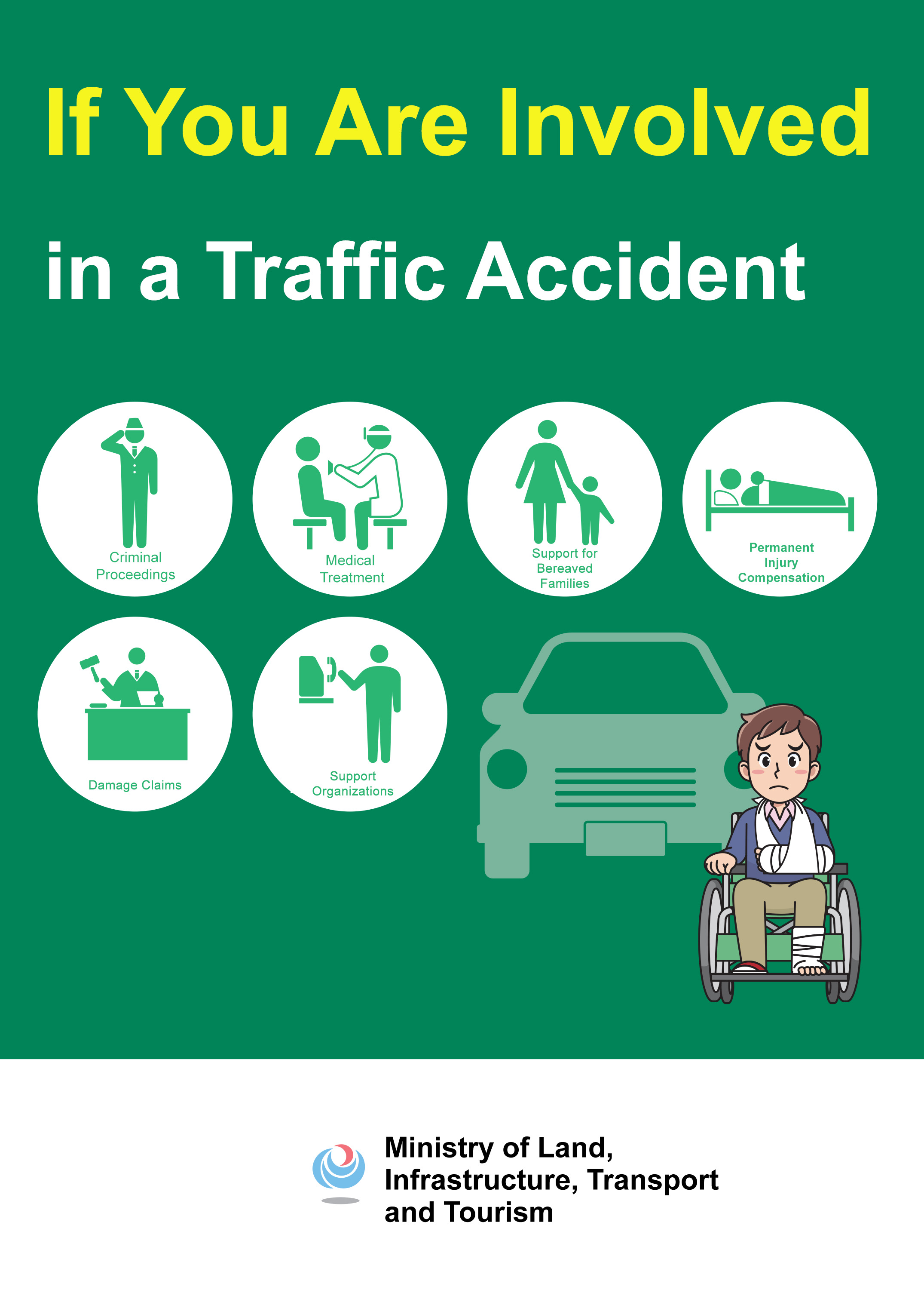
If You Are Involved in a Traffic Accident
The Ministry of Land, Infrastructure, Transport and Tourism (MLIT) has prepared a pamphlet titled "If You Are Involved in a Traffic Accident." This pamphlet informs and guides people who have been involved in a traffic accident about various systems and procedures. The challenges you face due to a sudden traffic accident will change over time. Please use the information in this pamphlet according to your situation at the time.
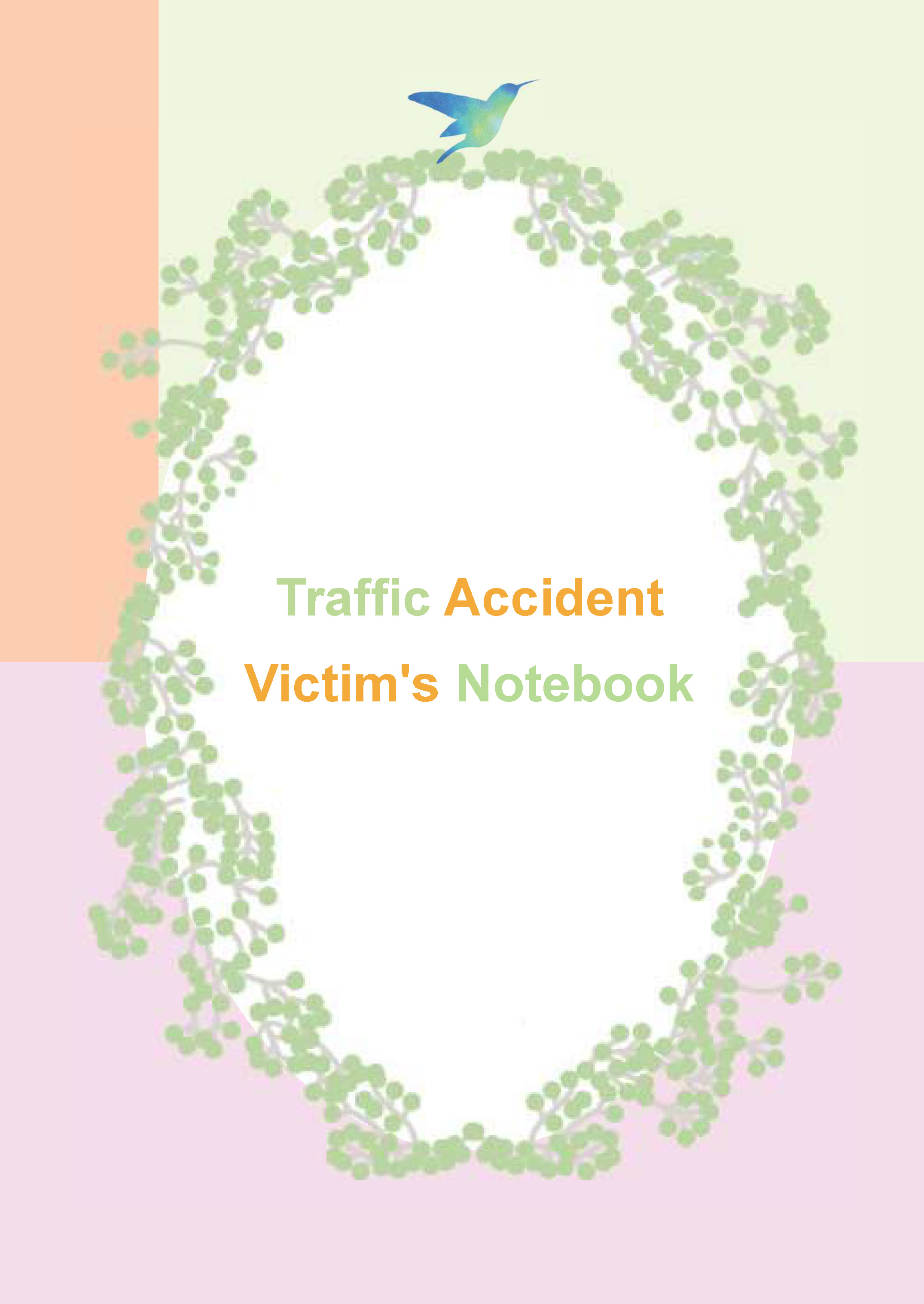
Traffic Accident Victim's Notebook
MLIT has created the “Traffic Accident Victim's Notebook” with the hope of providing support to automobile accident victims. The notebook allows victims and their families to record accident details and provides information about support systems available through police, local governments, and private victim support organizations. We also hope that it will provide support to all accident victims, and help to ease their concerns.